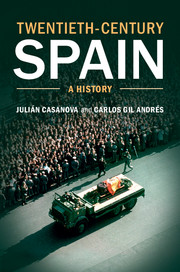Book contents
- Frontmatter
- Contents
- List of illustrations
- Key figures
- List of abbreviations
- Twentieth-century Spain timeline
- Maps
- Introduction
- Part I The monarchy of Alfonso XIII
- Part II The Second Republic
- Part III The Civil War
- Part IV Franco’s dictatorship
- 10 Franco’s peace
- 11 ‘The spiritual reserve of the world’
- 12 The death throes of Francoism
- Part V Transition and democracy
- Guide to further reading
- Index of names and authors
- References
12 - The death throes of Francoism
Published online by Cambridge University Press: 05 July 2014
- Frontmatter
- Contents
- List of illustrations
- Key figures
- List of abbreviations
- Twentieth-century Spain timeline
- Maps
- Introduction
- Part I The monarchy of Alfonso XIII
- Part II The Second Republic
- Part III The Civil War
- Part IV Franco’s dictatorship
- 10 Franco’s peace
- 11 ‘The spiritual reserve of the world’
- 12 The death throes of Francoism
- Part V Transition and democracy
- Guide to further reading
- Index of names and authors
- References
Summary
Franco died in his bed in 1975, putting an end to nearly forty years of a dictatorship that had been born from the ashes of a civil war. There followed a transition to democracy ‘from above’, instigated by authorities who had been active during Francoism, although it was negotiated in certain basic aspects with democratic opposition leaders. There are historians, such as José María Maravall and Julián Santamaría, who argue that the raw materials that brought about this particular mode of transition originated in the crisis that Franco’s regime experienced from the mid 1960s onwards. Thus the comprehensive political and cultural transition that followed the dictator’s death can only be judged in the light of the social changes that had begun fifteen years previously.
Other historians go further. The traumatic memory of the Civil War, fear of the army and the Francoist right, and the desire to avoid a repetition of such a violent conflict were very much to the fore during the early years of the transition. A dictatorship lasting forty years would have had a great influence on the period of transition from authoritarian domination to democracy, and this is what many of the experts have tried to explain and correlate.
- Type
- Chapter
- Information
- Twentieth-Century SpainA History, pp. 270 - 288Publisher: Cambridge University PressPrint publication year: 2014



